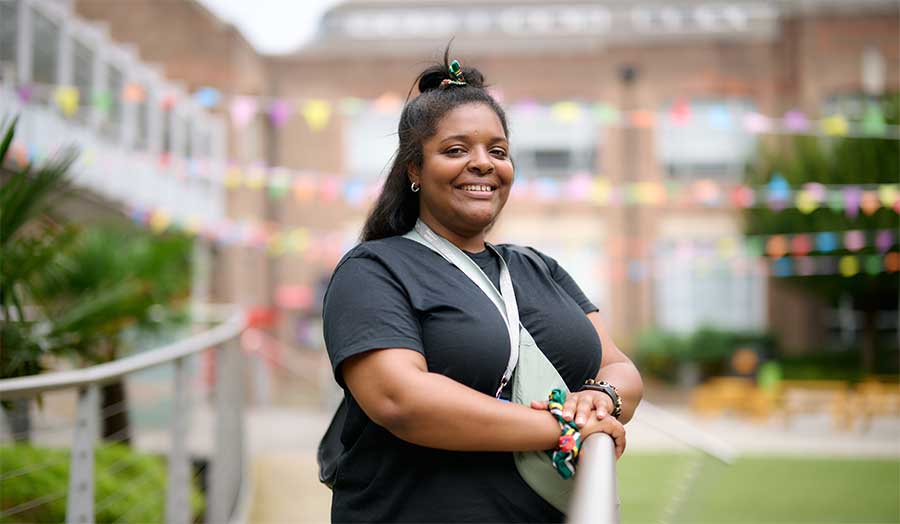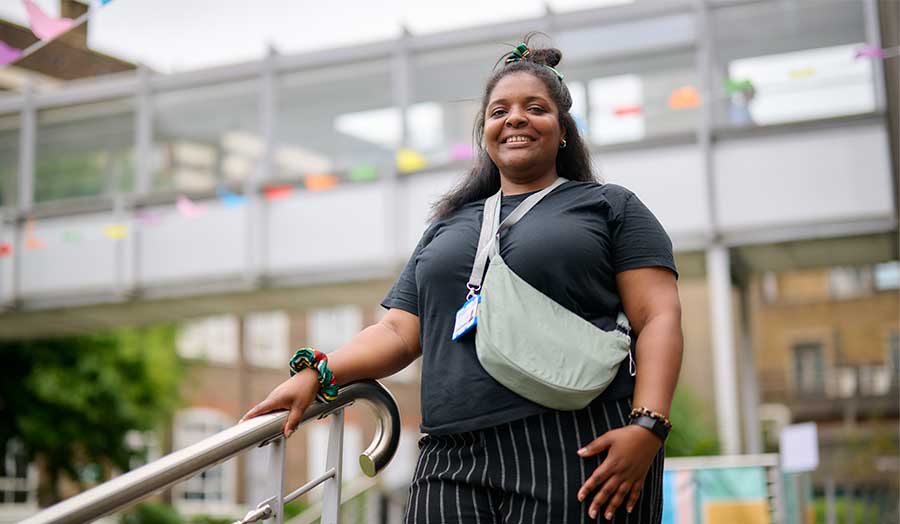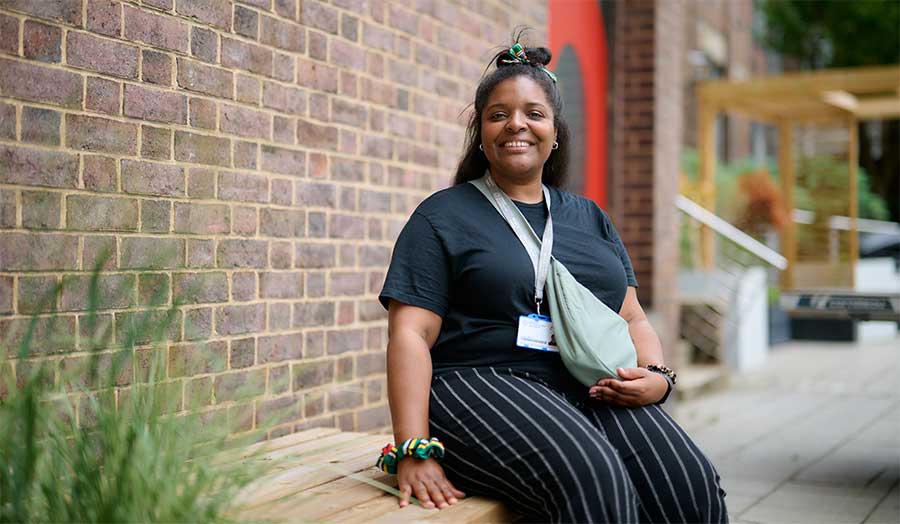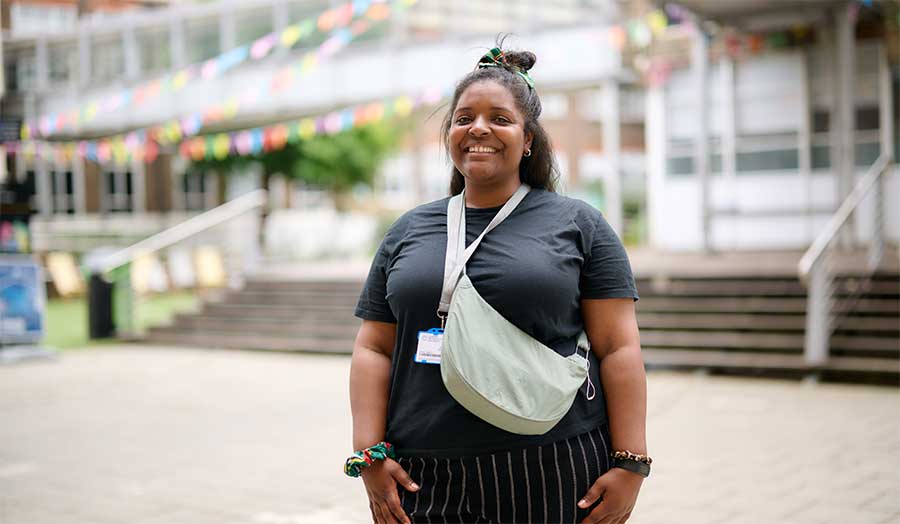Can you tell us a little bit about your background/previous career?
I have worked with children and families for 20 years now and my undergrad was in education which I started at London Met. I spent 10 years working in primary schools before I moved into the violence against women and children (VAWG) sector after I completed my MA with the Child and Woman Abuse Studies Unit (CWASU) here at London Met in 2017. I went on to work in the charity sector supporting women and families experiencing domestic abuse and then completed my PG Dip in 2021 with the Step Up to Social Work programme with Middlesex University.
What made you want to study your PhD at London Met in particular?
I have graduated from three universities, including London Met, and I always find myself coming back here. Completing my MA here was a great experience, both learning and support-wise. The expertise and knowledge at CWASU is an both asset and an honour to be able to tap into. I am a north London girl, my son is currently at London Met and my parents live down the road – so it just feels like home.
I understand your PhD deals with child sexual abuse experiences of Asian, African, Caribbean heritage children and young people – can you tell us more?
My research will look specifically at Asian, African and Caribbean heritage care-experienced children and young people. We know children from all races and ethnicities experience sexual abuse. However, research tells us Asian, African and Caribbean heritage children experience additional barriers to accessing adequate support and are less likely to disclose to professionals. The majority of research in this area is from adults looking at historical abuse. Research and practice show us that children and young people do talk, and want opportunities to talk about their own lives in their own words.
What do you hope the impact will be of your research?
I have a passion for young people and their voices being heard. From a social care perspective I think there is still a lot that practitioners can learn from listening to children and young people.
Social care as an institute is embedded in Eurocentric assessments and processes that do not always ensure good outcomes for Black, Asian and other racially minoritised families. We need to critically evaluate those areas of weakness and find practical ways to address them.
I hope we as practitioners can have a better understanding of ways to adequately address sexual abuse in those families.
What's been most challenging about being a research student?
Not having structured classes and assignments has been a big change for me and I work well into routines. So creating that independently has taken some time. My supervisors picked up on this difficulty quickly and have put plans in place to support me with this.
How have you found the professors / teachers?
I adore the staff at CWASU and having worked with them before previously it just felt very natural coming back. My supervisors have a good grasp on me and the whole CWASU team are approachable. I have also been able to join in on the MA classes that are relevant to my topic which has been great. Meeting the MA students who have a wide breadth of skills and knowledge in various areas of the VAWG sector.
Another great thing about being at CWASU is how well connected they are and I have had some great networking opportunities to build connections with other researchers and professionals in the sector.
What drives you?
Social justice, activism and advocating for others are real motivating influences for me. Pushing for others' voices to be heard. I acknowledge those who have helped me to get this far and I hope to be able to do this for others. I was a single teenage mother and things have not always been easy but with the right support and belief, anything is possible. So many people have inspired and encouraged me.
What are you most proud of in your life so far?
I feel like I am meant to say getting a scholarship and starting my PhD. But in fact, it would be my son getting to the third year of his Criminology degree. Being at the same university is nice, studying at home and learning from and with him has been cool, but I think he would likely disagree with that.
Are you working whilst studying? Tell us more, and how you make it fit in with your studies.
As part of my scholarship, I am only allowed to work part-time and I work for a great 'by and for' organisation, which aligns with my values and also has links to my PhD research. My manager is supportive so I have some flexibility around uni events. I also access clinical supervision through work which is a great space to debrief and reflect.
Initially, I found it difficult to find the balance as I enjoy my job and In the VAWG sector, it can be easy to become consumed by the work. I expected to just transition easily and actually, it was a period of time and not instant like I had assumed it would be.
Do you have a favourite place within the University and why?
I love the library at university and tend to get the most work completed when I go there. There is a study room that we have access to as PhD students and I just like to be surrounded by books. Denise is great, all the staff at the library are helpful and I like the mix of silent/solo working spaces and group spaces.
Have you used any of the services at London Met?
I have recently started with counselling and I had my assessment and then was allocated a worker swiftly. I have only had two sessions but my counsellor feels containing and the room is a nice space and always smells nice.
Are you a member of any research groups/centres at London Met?
The Uni has set up a VC Scholars group which has a range of students at different stages of their PhD and it’s been good getting to know the others, especially those in year 2 and 3 as they have lots of helpful tips and encouraging words when you feel a bit lost or overwhelmed.
From the induction I have joined a group of first year students and this is nice as we just check in on each other and also support each other at conferences if one is presenting and it is nice to be on the journey with others.
Tell us a little bit about your interests outside of uni and why they are important to you.
I tend to be busy all the time when I am not studying and life is full of responsibilities so I love travelling and getting away to a change of scenery and learning about new cultures.
Studying for a PhD can feel quite lonely as you are working alone on your project but I have great family and friend support and socialise often, maybe too often.
I enjoy reading, and I also am learning to enjoy silence and just being in the dark. It might sound strange but after an intense day just being still and sitting in the dark can feel very relaxing. Learning how to rest is a skill I am developing.
What's your plan when you complete your PhD, and how do you think London Met will help you succeed in this?
I will be completing my HEA teaching qualification as part of my PhD scholarship and look forward to having opportunities to lecture at London Met. I would also like to consider publishing.
I do not want my research to just sit on a shelf – I want it to mean something. By carrying out research with children and young people I want more research to be centred around children’s voices when focusing on the harm that children face. It is important for me that when professionals talk about good practice, and we see this documented in reports, to understand how this equates to positive outcomes for the children and young people we support. Who is judging this as good practice, do the professionals and children perceive this to be the same? I would want the research to be purposeful for children, young people and Local Authority practice.
I still enjoy frontline work and I hope to facilitate reflective practice workshops from the research findings.
Any tips for research students new to London Met?
Build a network, even if the other research students are not from your discipline you can learn things from each other, it can also be good to see if they can understand what you are writing about as an outsider. If you are finding it hard speak out, utilise your supervisors and the resources at the Uni. Remember why you are doing this, 'your why'.
You can follow Natalie on Instagram: phd_with_a_cup_of_tea
Twitter: @ThePracademicSW
LinkedIn: Natalie Johnson
Find out more about our PhD programmes

"I do not want my research to just sit on a shelf – I want it to mean something. By carrying out research with children and young people I want more research to be centred around children’s voices when focusing on the harm that children face."
Read more about our PhD programmes



